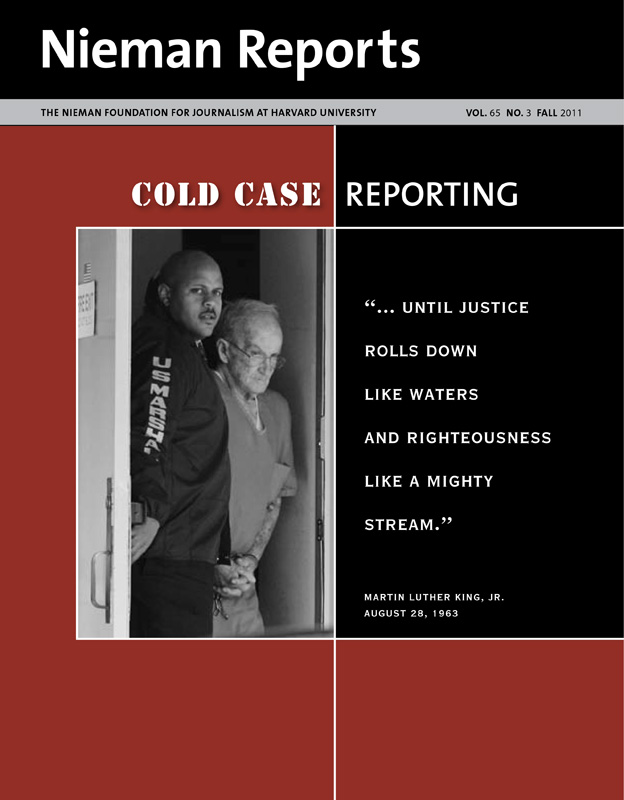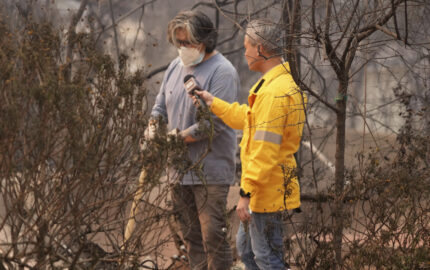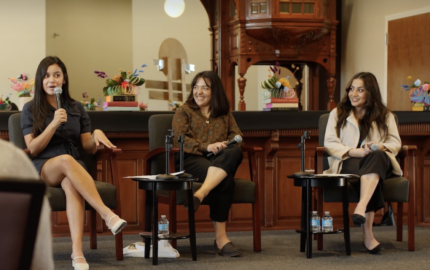
Cold Case Reporting
Cases unheard. Justice denied. These words fit many crimes committed with racial intent a half century ago. Now reporters burrow into forgotten files, locate witnesses, track down suspects, publish what they find—and write for us about their work that in some cases is resulting in justice finally being served. Journalists then explore how stories about black America are told today. Next, our focus turns to news reporting in a time of revolutionary change in Arab nations. Intriguing essays then transport us from Iran to Indonesia, from financial collapse to consensus building, from envisioning computers replacing journalists to reporting from war’s frontlines.
The Chinese characters for "crisis" can be translated into English as "danger" and "opportunity," definitions frequently used by mediators to encourage disputing parties to transform destructive conflict through mediation. Perhaps it is also appropriate to apply this translation to the crises in journalism and in our democracy, where it appears impossible to move beyond conflict-laden discourse and the reporting at the extremes of opposing points of view.
Americans are increasingly bombarded and troubled by the escalating amount of conflict conveyed by the news media, the destructive tone of political discourse, and the ways that journalists tend to sensationalize issues and the players involved. Long ago the news media adopted our cultural habit of competition to gain and sustain interest and scoop other news outlets. But this approach continues to cost us dearly as it forces us to confront seemingly insurmountable problems without the benefit of entering into civil conversation about them, let alone pointing the way toward solving them.
As a conflict mediator and more recently a media ethicist, I am struck by the similarities between how journalists frame their stories and how parties in disputes tell their stories. In mediation, parties harden their stances on issues, intensify their differences, and dwell on them until they are encouraged, through a facilitated process, to proceed in another direction. Using a different kind of language that explores interests and goals, parties can eventually see that mutually satisfying outcomes are possible.
RELATED ARTICLE
“What Mediation Looks Like for Journalists”
- Gilda C. Parrella Why, I wonder, do journalists appear so reluctant to adopt this approach, one that seeks to highlight common ground among disputing parties and explores systemic change? With such an approach, the ability to resolve conflict would be heightened, and this is the essence of my notion of consensus-building journalism.
Consensus, Not Conflict
Most of what we know about the world comes to us as secondhand information. We are at the mercy of storytellers—journalists primary among them—for approaching the truth of the matter, often based on how the story being told is framed. With conflict, our exposure is often intensified when storytellers exaggerate the distance separating opposing sides and views. Given the largely contentious space that the press occupies between government and the public, we have the makings of perpetual conflict.
With their coverage of nearly every news story, journalists have the option of framing it in a way that could bring about potential agreement and resolution without changing its essential facts. A story about climate change, for example, could be enhanced by defusing the angry language, treating opposing parties with respect, avoiding "either-or" frames, and searching for creative options that address multiple visions and diverse needs. Striving toward consensus-building journalism in a story about policy debates involving Medicare or Social Security would be more productive than categorizing winners and losers.
With digital media, the possibility exists for news organizations to engage people in mediated forums, providing a constructive venue for noninflammatory discussion—a refreshing alternative to what too often devolves into hate-filled speech.
What this country could use is an enormous mediation session, and in the unique role they hold, journalists are logical people to lead it. Mediators and journalists, after all, could share the role of an intermediary among disputing parties. How journalists in their role as intermediaries frame stories and go about reporting them determines a great deal about whether their content helps people confront differences and create roadways toward coexistence.
Ideally, citizens participate in the political process, educating themselves, voting and abiding by decisions made by legislatures and the courts. Citizens rely on the news media for factual information, context and commentary but more subliminally for models of discourse and conflict management. Unfortunately the overly competitive models have an impact on public morale as an unending stream of discord adds to feelings of dissatisfaction, anger and paralysis. We start to feel as though we are becoming helpless spectators to a destructive battle, doomed to a future of increased turmoil as the problems confronting us become more complex and threaten our way of life, if not our lives.
Restoring the investigatory and accountability functions of the press is essential but not enough in our polarized climate. Without a consensus building alternative—utilized regularly in all forms of media—it will be progressively more difficult for us to tackle environmental degradation, resource depletion, economic stagnation and deterioration, international crises, and natural and unnatural disasters.
The ingrained habit of framing issues as pro and con debates without sufficient attention to exploring common ground contributes to disempowering our national psyche. It might not be that we are experiencing a lack of political leadership as much as it is the lack of a functional communication process, and this restrains us from managing the enormous changes swirling around us.
Common Ground, Not Disparate Parties
Attempts to address journalism's economic predicament with paywalls, partnerships and foundation funding seem like stopgap measures—necessary in transitional times, but not enough for the long haul. While they are transforming the monologue to dialogue, still left unfinished is the opportunity to change the role of journalist from neutral observer to active intermediary with the intended goal of bringing together disparate parties in the search for common ground. Journalism has the chance to rethink not only its economic foundation but its relationship with society by establishing true dialogue and discussion with a facilitated model that can prompt citizen and, possibly, legislative action on vital issues of our time.
Consensus building as a part of journalism's mission would represent a major paradigm shift. It would move the reporter and editor away from a focus on conflict as motivating storytelling to one that highlights collaborative problem solving in an online community. Journalists already have many of the skills this type of enterprise requires. They develop and interview sources, investigate and analyze issues, report and write stories. Through social networks many of them engage with readers, listeners and viewers. Restraints of "objectivity" are being shoved aside, and so the transition to acting as intermediaries in resolving the challenges we face is not so daunting as it might have been even a few years ago. Some journalists might even be willing to learn mediation skills as a way of complementing the social media techniques they are using.
Among a younger generation who are unfamiliar with the traditions of journalism and favor interactive pursuits such as social media and online games (where players depend on one another to succeed), consensus building is likely to find wider acceptance. Given their increased exposure to the process of mediation—in educational settings and even in their homes—young people are among the population of users who report very high levels of satisfaction with the process. If mediation's practices and goals can be meshed with journalism's mission in ways that approach this high level of acceptance and satisfaction, then the work we, as citizens, need to do might head in a more positive direction.
Journalism and democratic institutions are linked symbiotically—a change in one can affect the other for good or for ill. Arguably, we are confronting an identity crisis in both, yet these crises may be the opportunities we need to experiment, revitalize and salvage what is best in both institutions.
Gilda C. Parrella is an associate professor in the School of Communication at Loyola University Chicago where she teaches courses in conflict management, mediation and media ethics. She has been active as a mediator, trainer and adviser on a journalist hotline for many years at home and abroad. This essay is part of an ongoing research project to develop a working model of consensus-building journalism for use by media outlets. She can be reached at gparrel@luc.edu.
Americans are increasingly bombarded and troubled by the escalating amount of conflict conveyed by the news media, the destructive tone of political discourse, and the ways that journalists tend to sensationalize issues and the players involved. Long ago the news media adopted our cultural habit of competition to gain and sustain interest and scoop other news outlets. But this approach continues to cost us dearly as it forces us to confront seemingly insurmountable problems without the benefit of entering into civil conversation about them, let alone pointing the way toward solving them.
As a conflict mediator and more recently a media ethicist, I am struck by the similarities between how journalists frame their stories and how parties in disputes tell their stories. In mediation, parties harden their stances on issues, intensify their differences, and dwell on them until they are encouraged, through a facilitated process, to proceed in another direction. Using a different kind of language that explores interests and goals, parties can eventually see that mutually satisfying outcomes are possible.
RELATED ARTICLE
“What Mediation Looks Like for Journalists”
- Gilda C. Parrella Why, I wonder, do journalists appear so reluctant to adopt this approach, one that seeks to highlight common ground among disputing parties and explores systemic change? With such an approach, the ability to resolve conflict would be heightened, and this is the essence of my notion of consensus-building journalism.
Consensus, Not Conflict
Most of what we know about the world comes to us as secondhand information. We are at the mercy of storytellers—journalists primary among them—for approaching the truth of the matter, often based on how the story being told is framed. With conflict, our exposure is often intensified when storytellers exaggerate the distance separating opposing sides and views. Given the largely contentious space that the press occupies between government and the public, we have the makings of perpetual conflict.
With their coverage of nearly every news story, journalists have the option of framing it in a way that could bring about potential agreement and resolution without changing its essential facts. A story about climate change, for example, could be enhanced by defusing the angry language, treating opposing parties with respect, avoiding "either-or" frames, and searching for creative options that address multiple visions and diverse needs. Striving toward consensus-building journalism in a story about policy debates involving Medicare or Social Security would be more productive than categorizing winners and losers.
With digital media, the possibility exists for news organizations to engage people in mediated forums, providing a constructive venue for noninflammatory discussion—a refreshing alternative to what too often devolves into hate-filled speech.
What this country could use is an enormous mediation session, and in the unique role they hold, journalists are logical people to lead it. Mediators and journalists, after all, could share the role of an intermediary among disputing parties. How journalists in their role as intermediaries frame stories and go about reporting them determines a great deal about whether their content helps people confront differences and create roadways toward coexistence.
Ideally, citizens participate in the political process, educating themselves, voting and abiding by decisions made by legislatures and the courts. Citizens rely on the news media for factual information, context and commentary but more subliminally for models of discourse and conflict management. Unfortunately the overly competitive models have an impact on public morale as an unending stream of discord adds to feelings of dissatisfaction, anger and paralysis. We start to feel as though we are becoming helpless spectators to a destructive battle, doomed to a future of increased turmoil as the problems confronting us become more complex and threaten our way of life, if not our lives.
Restoring the investigatory and accountability functions of the press is essential but not enough in our polarized climate. Without a consensus building alternative—utilized regularly in all forms of media—it will be progressively more difficult for us to tackle environmental degradation, resource depletion, economic stagnation and deterioration, international crises, and natural and unnatural disasters.
The ingrained habit of framing issues as pro and con debates without sufficient attention to exploring common ground contributes to disempowering our national psyche. It might not be that we are experiencing a lack of political leadership as much as it is the lack of a functional communication process, and this restrains us from managing the enormous changes swirling around us.
Common Ground, Not Disparate Parties
Attempts to address journalism's economic predicament with paywalls, partnerships and foundation funding seem like stopgap measures—necessary in transitional times, but not enough for the long haul. While they are transforming the monologue to dialogue, still left unfinished is the opportunity to change the role of journalist from neutral observer to active intermediary with the intended goal of bringing together disparate parties in the search for common ground. Journalism has the chance to rethink not only its economic foundation but its relationship with society by establishing true dialogue and discussion with a facilitated model that can prompt citizen and, possibly, legislative action on vital issues of our time.
Consensus building as a part of journalism's mission would represent a major paradigm shift. It would move the reporter and editor away from a focus on conflict as motivating storytelling to one that highlights collaborative problem solving in an online community. Journalists already have many of the skills this type of enterprise requires. They develop and interview sources, investigate and analyze issues, report and write stories. Through social networks many of them engage with readers, listeners and viewers. Restraints of "objectivity" are being shoved aside, and so the transition to acting as intermediaries in resolving the challenges we face is not so daunting as it might have been even a few years ago. Some journalists might even be willing to learn mediation skills as a way of complementing the social media techniques they are using.
Among a younger generation who are unfamiliar with the traditions of journalism and favor interactive pursuits such as social media and online games (where players depend on one another to succeed), consensus building is likely to find wider acceptance. Given their increased exposure to the process of mediation—in educational settings and even in their homes—young people are among the population of users who report very high levels of satisfaction with the process. If mediation's practices and goals can be meshed with journalism's mission in ways that approach this high level of acceptance and satisfaction, then the work we, as citizens, need to do might head in a more positive direction.
Journalism and democratic institutions are linked symbiotically—a change in one can affect the other for good or for ill. Arguably, we are confronting an identity crisis in both, yet these crises may be the opportunities we need to experiment, revitalize and salvage what is best in both institutions.
Gilda C. Parrella is an associate professor in the School of Communication at Loyola University Chicago where she teaches courses in conflict management, mediation and media ethics. She has been active as a mediator, trainer and adviser on a journalist hotline for many years at home and abroad. This essay is part of an ongoing research project to develop a working model of consensus-building journalism for use by media outlets. She can be reached at gparrel@luc.edu.


